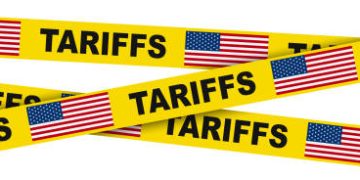Supply Chain Report – 10/06/2025
Bank of Japan Governor Kazuo Ueda said on Friday that significant uncertainty remains surrounding the potential impact of U.S. tariff measures on Japan’s economy, highlighting that trade policy developments abroad continue to weigh heavily on the country’s economic outlook.
Speaking at a press conference in Osaka, Ueda pointed to the central bank’s September “tankan” quarterly survey, which showed a slight but encouraging improvement in business sentiment among large manufacturers. The tankan survey, regarded as one of Japan’s most reliable indicators of corporate confidence, reflected cautious optimism within the industrial sector. Ueda noted that these results increase the likelihood that the Bank of Japan’s forecasts for growth and inflation will be realized.
Even so, Ueda cautioned that the outlook is far from secure. He stressed that the effect of U.S. tariffs, particularly their scope and duration, remains a source of considerable uncertainty. Japan, as a major exporter with deep connections to global supply chains, could face ripple effects across multiple industries depending on how U.S. trade measures evolve. “The uncertainty remains considerably large,” Ueda said, underscoring the challenges that such external developments pose for monetary policy planning.
The Bank of Japan has been navigating a complex economic environment marked by rising energy costs, shifting supply chain patterns, and cautious consumer demand. Financial markets are closely monitoring whether the BOJ will move toward additional interest rate hikes, with many participants expecting that such a decision could come as soon as this month.
Ueda, however, tempered expectations, suggesting that while the central bank remains vigilant, it does not anticipate falling behind international monetary policy trends. “I don’t think such a possibility is high,” he said when asked about concerns that the BOJ could lag behind global central banks in adjusting its stance.
Economists note that tariffs can create wide-ranging effects on economies like Japan’s, not only by directly impacting exporters but also by influencing raw material costs, investment decisions, and long-term supply chain strategies. Industries such as automotive, electronics, and machinery — key pillars of Japan’s manufacturing sector — are especially sensitive to changes in trade policy.
The U.S. tariffs come at a time when Japan is working to balance inflationary pressures with the need to support steady economic growth. While inflation has edged closer to the BOJ’s 2 percent target, much of the price pressure has stemmed from higher import costs rather than domestic demand-driven growth, complicating the central bank’s decision-making process.
Looking ahead, Ueda emphasized the importance of continued monitoring of both domestic economic conditions and external risks. With global trade dynamics shifting and major economies adjusting policy in response to inflation and growth trends, the BOJ faces the challenge of maintaining stability while preparing for potential volatility in global markets.
For businesses in Japan, the uncertainty tied to U.S. tariffs has already prompted concerns over investment planning and supply chain resilience. Some firms are exploring ways to diversify sourcing and reduce exposure to overseas policy changes, though such adjustments take time and resources to implement.
As the Bank of Japan prepares for upcoming policy meetings, analysts say that Ueda’s remarks serve as a reminder that international trade developments will remain a critical factor in shaping Japan’s economic trajectory in the months ahead.
#SupplyChainNews #NewsUpdate #GlobalEconomy #TradePolicy #JapanFinance















